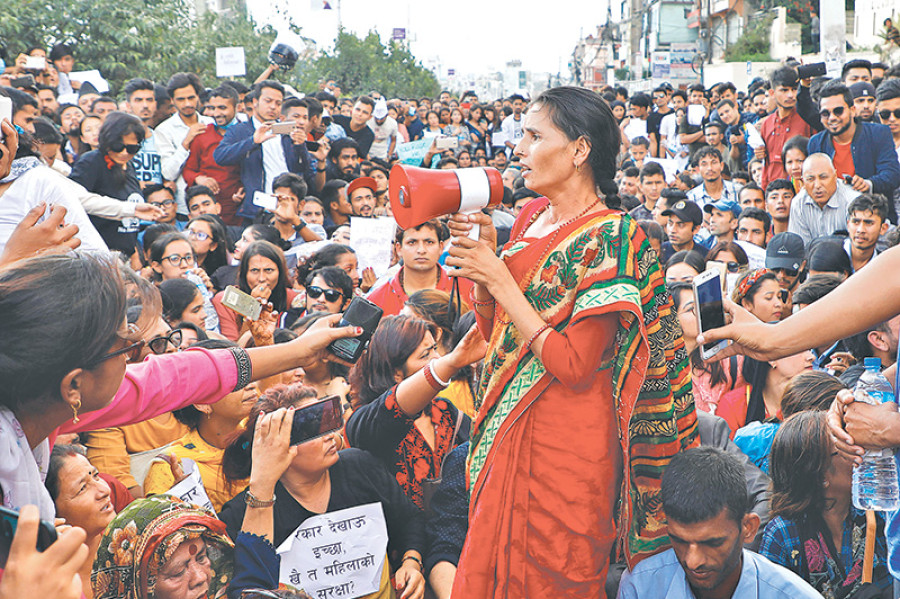Opinion
Beyond the law
The rape and murder case of Nirmala Pant makes a mockery of the rule of law
Shreya Paudel
The tragic case of Nirmala Pant has exposed the Nepal Police to its core. Superintendent of Police (SP) Dilli Raj Bista was supposed to investigate Nirmala Pant’s rape and murder.
Instead, police personnel under his command tampered with the evidence. Nirmala’s genitals and clothes were washed and evidence was erased. Her parents faced constant threats from the police, forcing them to cremate her body before forensic tests could be carried out. The police then arrested a mentally ill person on the charge of being the rapist, who has since been proven innocent by a DNA test. The Nepal Police further lost its credibility by killing a child who was demanding justice for Nirmala during a demonstration.
It seems the Nepal Police is somehow involved in all sorts of criminal cases—from gold smuggling at Tribhuvan International Airport to the Sudan corruption scam and now this rape and murder of an innocent girl. These are only a few cases that have come to light. Imagine how many other cases there might be where the police could be involved in protecting criminals and sometimes being the criminals themselves. How many innocent people could the police have thrown into jail to protect the actual criminals? If the government takes pains to conduct earnest investigations, one can imagine the police being implicated in numerous criminal cases. This author sincerely hopes to be proven wrong, but the police’s recent actions suggest otherwise.
The other party which has acted irresponsibly is the government itself. This is supposed to be a communist government which professes to stand up for the underdogs in society; in this case, Nirmala Pant and her parents who sell pani-puri for a living. The communist government preferred to stay quiet until demonstrations forced it to do something. Then it mumbled a few official lines without much substance. Nepal Communist Party Co-Chairman Pushpa Kamal Dahal even ludicrously alleged that cases of violence against women were being conducted with the intention of smearing the government. On the other hand, Prime Minister Oli sounds aggressively defensive, as always, on the government’s performance in this case.
Meanwhile, the government has not arrested any of the police officers involved in tampering with the evidence. After a series of public protests, it has merely transferred some of the policemen to Kathmandu and suspended a few of them including SP Bista. One can imagine Bista and his stooges doing whatever they can to stop this case from reaching any meaningful and just conclusion. This brings us to an important question of our times: Does this communist government really represent whom it claims to represent? Can it truly put the marginalised people’s interest at the heart of its governance? Or is it only paying lip service to win elections?
The final party to be blamed is the prevailing patriarchal social structure. It is largely based on the idea that women are there just for men’s consumption—physical and emotional. But a man’s sexual desire cannot become his entitlement upon women. The latter do not have any obligation to fulfil lewd carnal desires of a man. Cases of rape, which is arguably the ultimate expression of patriarchy, can be reduced if the legal system works well without corruption. However, the larger cultural phenomenon of patriarchy cannot be changed with a silver bullet. As patriarchy has been woven into our culture, religion and language for too long, our society will have to go through a cleansing educational process. And the least that men can do is acknowledge their privilege and start correcting it.
It has been almost two months since Nirmala was murdered. It is widely believed that the perpetrators could be highly placed men who are being protected by the police and the administration. Despite society’s uproar and the Kathmandu media and activists demanding justice, it cannot be seen anywhere on the horizon. Therefore, it is difficult to imagine what most girls and women who have been raped have to go through as they do not come to the notice of Kathmandu’s civil society.
According to the police data itself, there are three rapes per day in Nepal, and 1,131 cases of rape took place in the fiscal year 2016-17. Although the Nirmala rape case will be remembered as a black chapter for the authorities, it could be taken as an opportunity for the government, Nepal Police and society to do some soul searching to understand and prevent rape. However, all is not lost. People throughout the country assertively demanding justice for Nirmala and other rape victims shows that they have had enough. They are willing to speak up for what is right. #JusticeForNirmala
Paudel holds a Master’s degree in Conflict Studies from the London School of Economics.




 16.33°C Kathmandu
16.33°C Kathmandu










